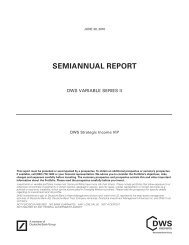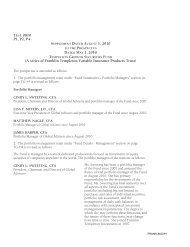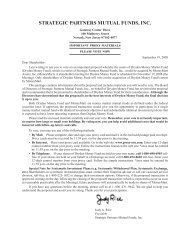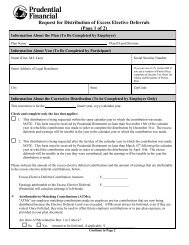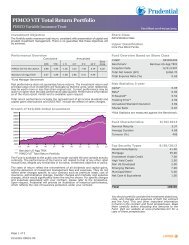Prudential Premier Retirement Variable Annuities
Prudential Premier Retirement Variable Annuities
Prudential Premier Retirement Variable Annuities
Create successful ePaper yourself
Turn your PDF publications into a flip-book with our unique Google optimized e-Paper software.
TAX CONSIDERATIONS<br />
The tax considerations associated with an Annuity vary depending on whether the contract is (i) owned by an individual or<br />
non-natural person, and not associated with a tax-favored retirement plan, or (ii) held under a tax-favored retirement plan. We<br />
discuss the tax considerations for these categories of contracts below. The discussion is general in nature and describes only federal<br />
income tax law (not state or other tax laws). It is based on current law and interpretations, which may change. The information<br />
provided is not intended as tax advice. You should consult with a qualified tax advisor for complete information and advice.<br />
References to Purchase Payments below relate to your cost basis in your contract. Generally, your cost basis in a contract not<br />
associated with a tax-favored retirement plan is the amount you pay into your contract, or into annuities exchanged for your<br />
contract, on an after-tax basis less any withdrawals of such payments. Cost basis for a tax-favored retirement plan is provided only<br />
in limited circumstances, such as for contributions to a Roth IRA or nondeductible IRA. The discussion includes a description of<br />
certain spousal rights under the contract, and our administration of such spousal rights and related tax reporting comport with our<br />
understanding of the Defense of Marriage Act (which defines a “marriage” as a legal union between a man and a woman and a<br />
“spouse” as a person of the opposite sex). Depending on the state in which your annuity is issued, we may offer certain spousal<br />
benefits to civil union couples, domestic partners or same-sex marriages. You should be aware, however, that federal tax law does<br />
not recognize civil union couples, domestic partners or marriage spouses of the same sex. Therefore, we cannot permit a same-sex<br />
civil union partner, domestic partner or spouse to continue the annuity within the meaning of the tax law upon the death of the first<br />
partner under the annuity’s “spousal continuance” provision. Please note there may be federal tax consequences at the death of the<br />
first same-sex civil union partner, domestic partner or spouse. Civil union couples, domestic partners and spouses of the same sex<br />
should consider that limitation before selecting a spousal benefit under the annuity.<br />
The discussion below generally assumes that the Annuity is issued to the Annuity Owner. For <strong>Annuities</strong> issued under the<br />
Beneficiary Continuation Option or as a Beneficiary Annuity, refer to the Taxes Payable by Beneficiaries for Nonqualified Annuity<br />
Contracts and Required Distributions Upon Your Death for Qualified Annuity Contracts in this Tax Considerations section.<br />
NONQUALIFIED ANNUITY CONTRACTS<br />
In general, as used in this prospectus, a Nonqualified Annuity is owned by an individual or non-natural person and is not<br />
associated with a tax-favored retirement plan.<br />
Taxes Payable by You We believe the Annuity is an annuity contract for tax purposes. Accordingly, as a general rule, you should<br />
not pay any tax until you receive money under the contract. Generally, annuity contracts issued by the same company (and<br />
affiliates) to you during the same calendar year must be treated as one annuity contract for purposes of determining the amount<br />
subject to tax under the rules described below. Charges for investment advisory fees that are taken from the contract are treated as a<br />
partial withdrawal from the contract and will be reported as such to the contract Owner.<br />
It is possible that the Internal Revenue Service (IRS) could assert that some or all of the charges for the optional benefits under the<br />
contract should be treated for federal income tax purposes as a partial withdrawal from the contract. If this were the case, the<br />
charge for this benefit could be deemed a withdrawal and treated as taxable to the extent there are earnings in the contract.<br />
Additionally, for Owners under age 59 1 ⁄2, the taxable income attributable to the charge for the benefit could be subject to a tax<br />
penalty. If the IRS determines that the charges for one or more benefits under the contract are taxable withdrawals, then the sole or<br />
surviving Owner will be provided with a notice from us describing available alternatives regarding these benefits.<br />
You must commence annuity payments or surrender your Annuity no later than the first day of the calendar month next following<br />
the maximum Annuity date for your Annuity. For some of our contracts, you are able to choose to defer the Annuity Date beyond<br />
the default Annuity date described in your Annuity. However, the IRS may not then consider your contract to be an annuity under<br />
the tax law.<br />
Taxes on Withdrawals and Surrender If you make a withdrawal from your contract or surrender it before annuity payments<br />
begin, the amount you receive will be taxed as ordinary income, rather than as return of Purchase Payments, until all gain has been<br />
withdrawn. Once all gain has been withdrawn, payments will be treated as a nontaxable return of Purchase Payments until all<br />
Purchase Payments have been returned. After all Purchase Payments are returned, all subsequent amounts will be taxed as ordinary<br />
income. You will generally be taxed on any withdrawals from the contract while you are alive even if the withdrawal is paid to<br />
someone else. Withdrawals under any of the optional living benefits or as a systematic payment are taxed under these rules. If you<br />
assign or pledge all or part of your contract as collateral for a loan, the part assigned generally will be treated as a withdrawal and<br />
subject to income tax to the extent of gain. If you transfer your contract for less than full consideration, such as by gift, you will<br />
also trigger tax on any gain in the contract. This rule does not apply if you transfer the contract to your spouse or under most<br />
circumstances if you transfer the contract incident to divorce.<br />
If you choose to receive payments under an interest payment option, or a Beneficiary chooses to receive a death benefit under an<br />
interest payment option, that election will be treated, for tax purposes, as surrendering your Annuity and will immediately subject<br />
any gain in the contract to income tax.<br />
114





